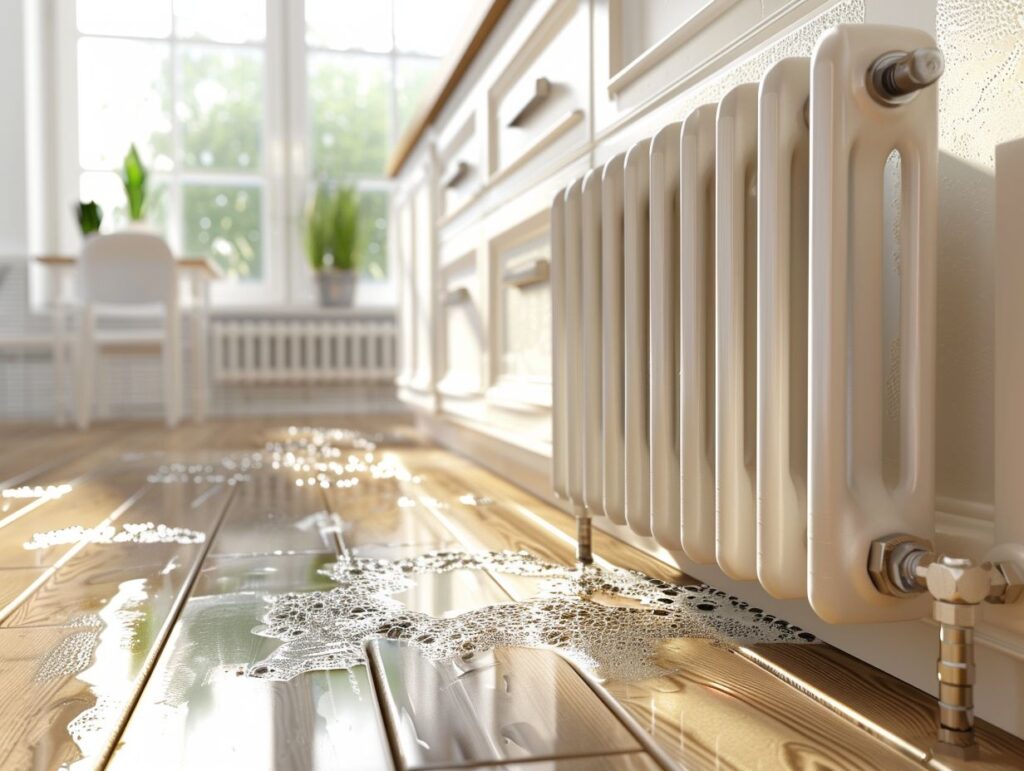If you are noticing a puddle of water around your kitchen radiator and are curious about the cause of the leak, we will explore possible reasons for radiator leaks, ways to pinpoint the source, and offer do-it-yourself solutions for repair.
Additionally, we will address when it may be necessary to enlist the assistance of a professional and provide maintenance advice to avoid future leaks. Discover more about maintaining your kitchen radiator in optimal condition.
Key Takeaways:
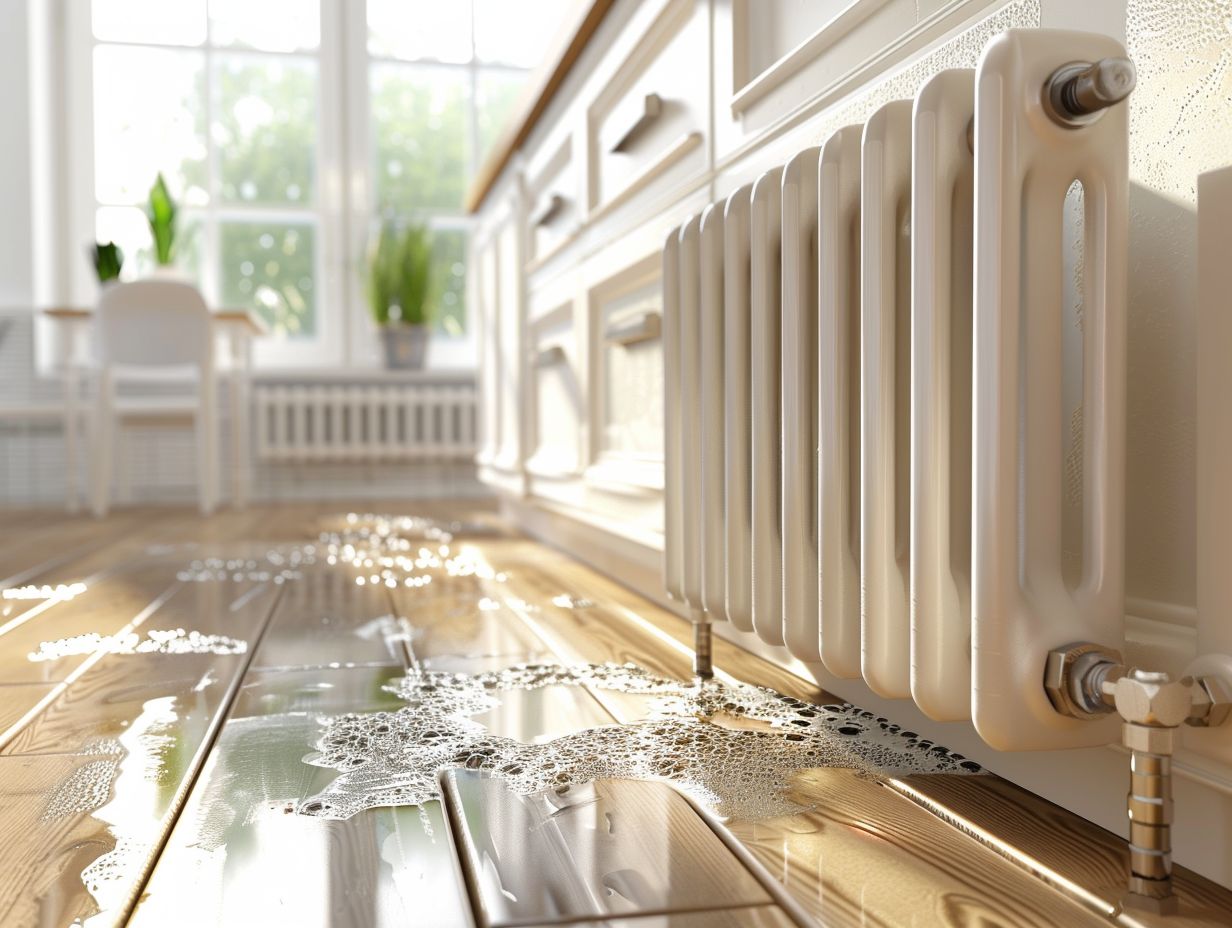
- A leaking kitchen radiator can be caused by various issues such as corrosion, loose fittings, or damaged seals.
- Signs of a leaking radiator include puddles of water, damp spots, and reduced heating efficiency in the kitchen.
- DIY solutions for fixing a leaking radiator include tightening fittings, replacing seals, or using a sealant. Calling a professional may be necessary for more complex issues.
- To prevent future leaks, regular maintenance such as checking for drips and replacing old radiators can help. Also, ensuring proper installation and using high-quality materials can help prevent leaks.
Understanding Radiator Leaks
Understanding radiator leaks is essential for maintaining the efficiency and functionality of your heating system. Leaks may arise from a variety of factors, such as corrosion, faulty valves, or deteriorating radiator bodies.
Promptly addressing radiator leaks is crucial for preventing further damage to your heating system and potential water wastage. Failure to address leaks can lead to reduced heating efficiency and an increased risk of system failure.
Common causes of radiator leaks, like corrosion and faulty valves, can result in water seepage and a loss of pressure within the system. Early identification and repair of leaks can save both money and protect the environment, as wasted water and decreased system performance are two significant outcomes of neglected radiator maintenance.
Possible Causes of Leaks
Identifying the possible causes of radiator leaks is crucial for effective troubleshooting. Common causes include corrosion, worn-out spindle valves, and inadequate PTFE tape sealing.
Corrosion often serves as a prominent factor in radiator leaks, particularly in older systems where the metal is exposed to moisture over time. The gradual process of metal oxidation weakens the radiator’s structure, creating vulnerabilities that can result in leaks.
Similarly, spindle valves, responsible for regulating coolant flow, may deteriorate over prolonged use, leading to leaks around the valve stems. Proper sealing with PTFE tape is essential to prevent leaks at connection points, ensuring a tight and secure seal that can withstand the pressure within the radiator system.
Identifying the Source of the Leak
Identifying the specific source of a radiator leak can help you in applying targeted repair solutions. Pinhole leaks around nuts or valves are common culprits for radiator leaks.
It is crucial to closely observe around the radiator’s connecting points, such as the inlet and outlet, to detect leaks. Additionally, checking the pressure cap and hoses for any signs of damage or cracks can also help reveal potential leak locations.
Using a radiator pressure tester can help in pinpointing leaks by pressurising the system and monitoring for any decreases in pressure. Promptly addressing any identified leaks is important to prevent further damage and ensure optimal radiator performance.
Signs and Symptoms
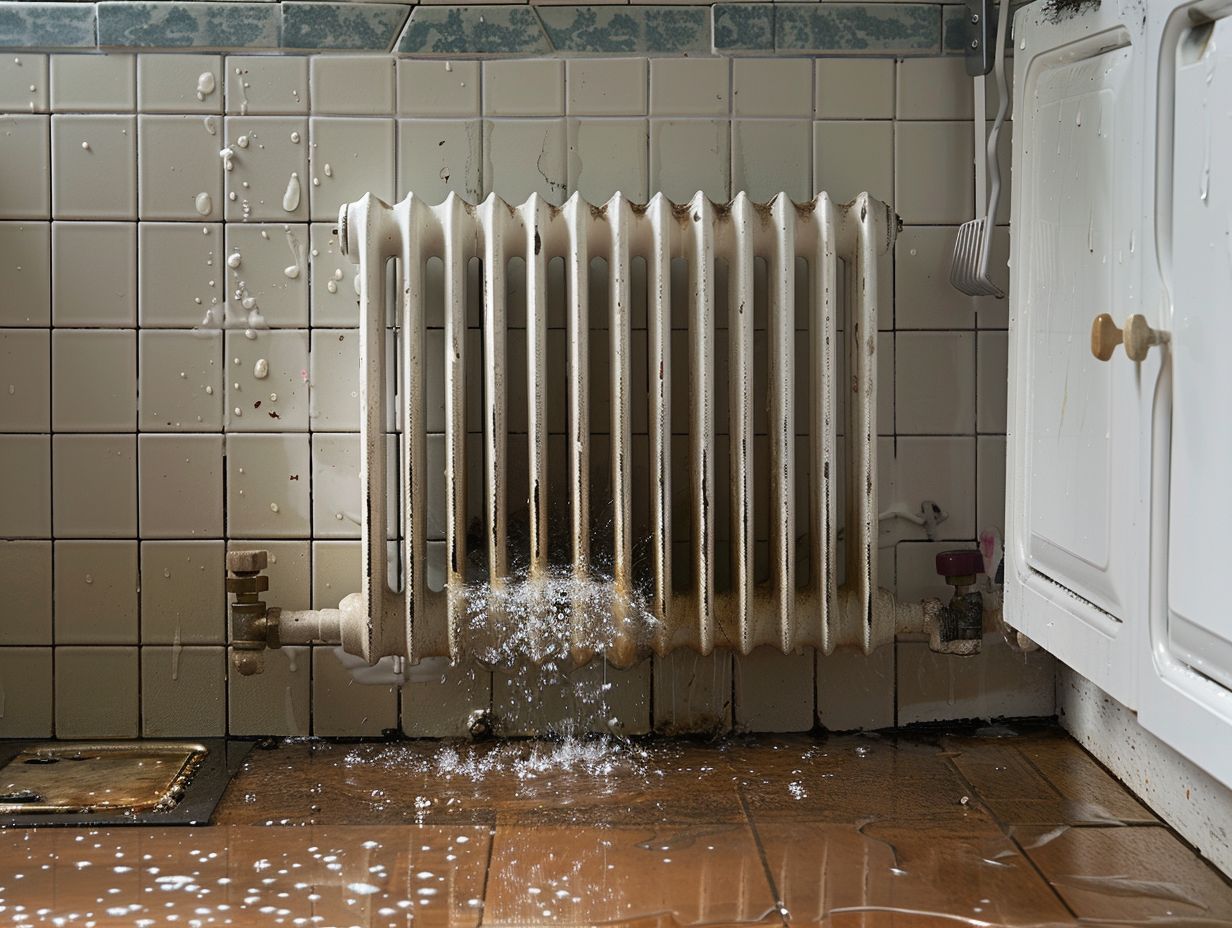
Recognising the signs and symptoms of a leaky radiator is essential for timely intervention. Persistent leaks can lead to issues such as scale buildup, rust formation, and compromised heating system efficiency.
One common indicator of a radiator leak is the presence of water or coolant under your vehicle after it has been parked. This can often be identified by a green or pinkish puddle forming where the car was parked. If you observe a strong sweet smell coming from the engine area, it could indicate a coolant leak.
Neglecting to address these leaks promptly can result in more severe consequences, including overheating and potential engine damage. Regular maintenance checks are essential to prevent these issues and ensure the longevity of your heating system.
Fixing a Leaking Kitchen Radiator
When addressing a leaking kitchen radiator, consider whether to attempt DIY solutions or enlist the services of a professional plumber. Proper identification of the leak source, whether at the body or joint, is essential for effective resolution.
If you observe water accumulation around your radiator, start by examining both the body and joints for indications of leakage. For leaks at the body, resolving the issue often involves tightening any loose fittings or replacing damaged valves.
In the case of joint leaks, a temporary solution can be achieved by applying a sealant or plumber’s tape. Should the leaks be complex or if you lack confidence in the repair process, it is advisable to seek assistance from a qualified plumber. Their professional expertise can ensure a lasting and effective solution.
DIY Solutions
When opting for DIY solutions to fix a leaking radiator, consider replacing faulty components such as nuts or using PTFE tape for sealing as effective temporary measures. Always remember to bleed the system after making any repairs.
If you notice a leak in the radiator, begin by identifying the specific component causing the issue. This may be a damaged gasket, cracked fitting, or corroded valve.
Once the problem area has been identified, carefully remove the defective part and replace it with a high-quality replacement. Applying PTFE tape to the threads of fittings before reassembly can help create a tight seal and prevent further leakage.
After the replacement and sealing process, it is essential to bleed the radiator system to remove any trapped air bubbles, ensuring optimal functionality.
When to Call a Professional?
When facing complex issues like malfunctioning radiator valves or leaky radiators, it is recommended to contact a professional plumber for expert assessment and repair.
Professional plumbers possess the expertise and capabilities to pinpoint the underlying problem, whether it be a faulty valve causing pressure issues or corrosion in an ageing radiator leading to leaks. They can advise on appropriate replacement parts or conduct essential maintenance to optimise the radiator’s performance.
Attempting DIY repairs on these matters may exacerbate the damage or pose safety risks, underscoring the significance of relying on experienced professionals for radiator repairs.
Preventing Future Leaks
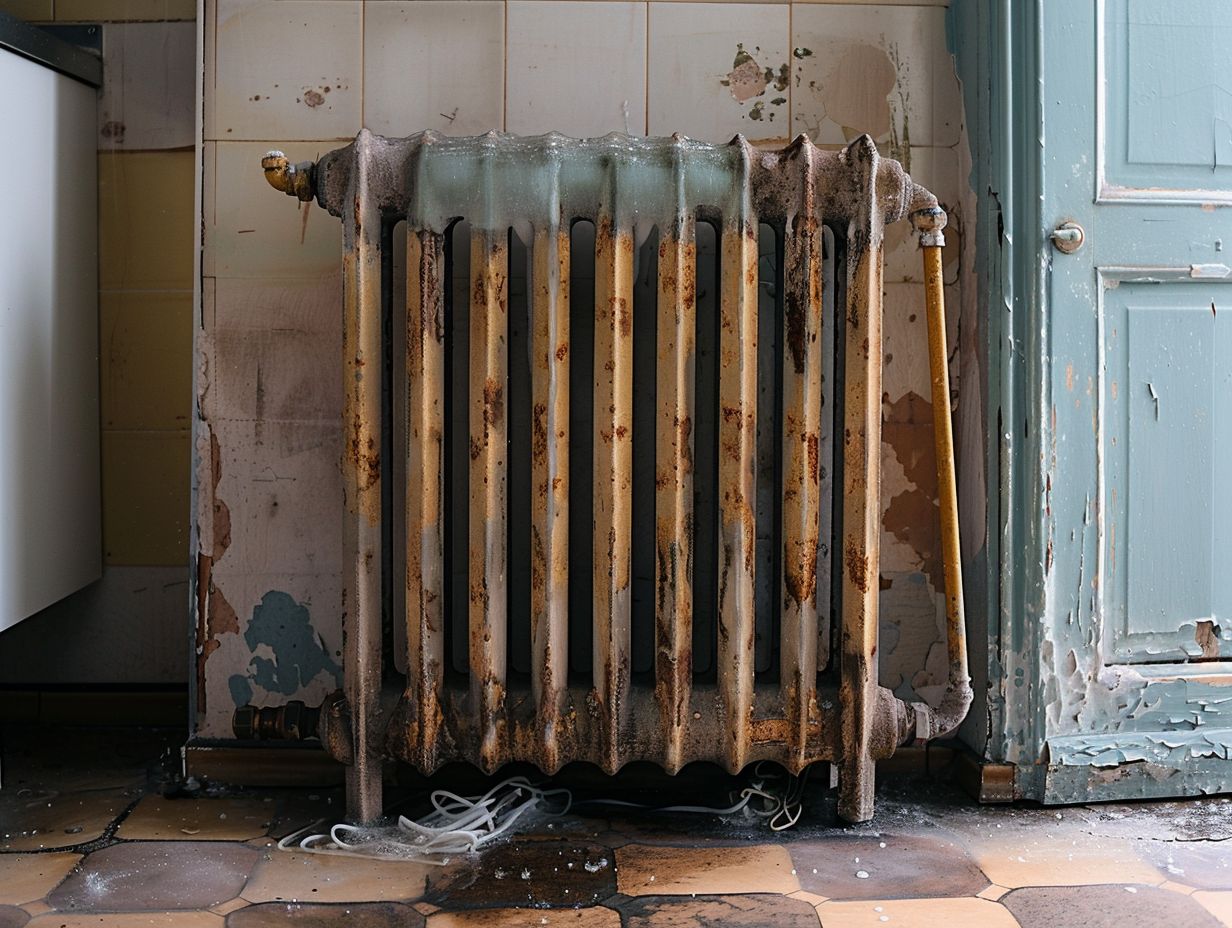
To prevent future radiator leaks, you need to implement regular maintenance tips, such as using chemical inhibitors to prevent scale build-up and corrosion within the heating system. It is crucial to also regularly check for any signs of leakage or rust on the radiator.
Inspecting the radiator valves, pipes, and fittings for any wear and tear can help catch potential issues early on. Another effective method for preventing future leaks is to flush the radiator system regularly to remove any sediment or debris that could cause blockages and corrosion.
By incorporating these proactive measures into your radiator maintenance routine, you can prolong the lifespan of your heating system and avoid costly repairs.
Maintenance Tips
Routine maintenance is crucial for your radiator’s long life. Replace any rusted components promptly to prevent system-wide issues and ensure the efficient operation of your heating system. Plus component replacement, regularly flushing the radiator system with a quality coolant can help prevent rust build-up.
Check for leaks or cracks in your radiator and hoses, addressing them promptly to avoid overheating. Maintaining proper water levels and ensuring your radiator cap is in good condition are essential for efficient cooling.
Keep the fins and exterior of your radiator clean from debris to allow optimal airflow. Consider investing in a radiator cover during the winter months to protect it from extreme cold temperatures.
Replacing Old Radiators
Replacing old radiators can significantly improve heating system efficiency, especially if your current radiators are susceptible to leaks or have worn-out spindles. Upgrading to new radiators can enhance the overall performance of your heating system.
When you replace outdated radiators with newer models, you can experience improved heat distribution and energy savings. New radiators are designed to deliver better heat output, ensuring a consistent and comfortable temperature in every room. They are also less prone to leaks, reducing the risk of water damage to your property.
When contemplating radiator replacement, it’s crucial to evaluate the condition of the spindle. Worn-out spindles can lead to inefficiencies in heat transfer. Checking the body integrity of your radiators is also important, as any signs of corrosion or damage may indicate the necessity for replacement to prevent potential malfunctions.
Frequently Asked Questions
Why Is My Kitchen Radiator Leaking?
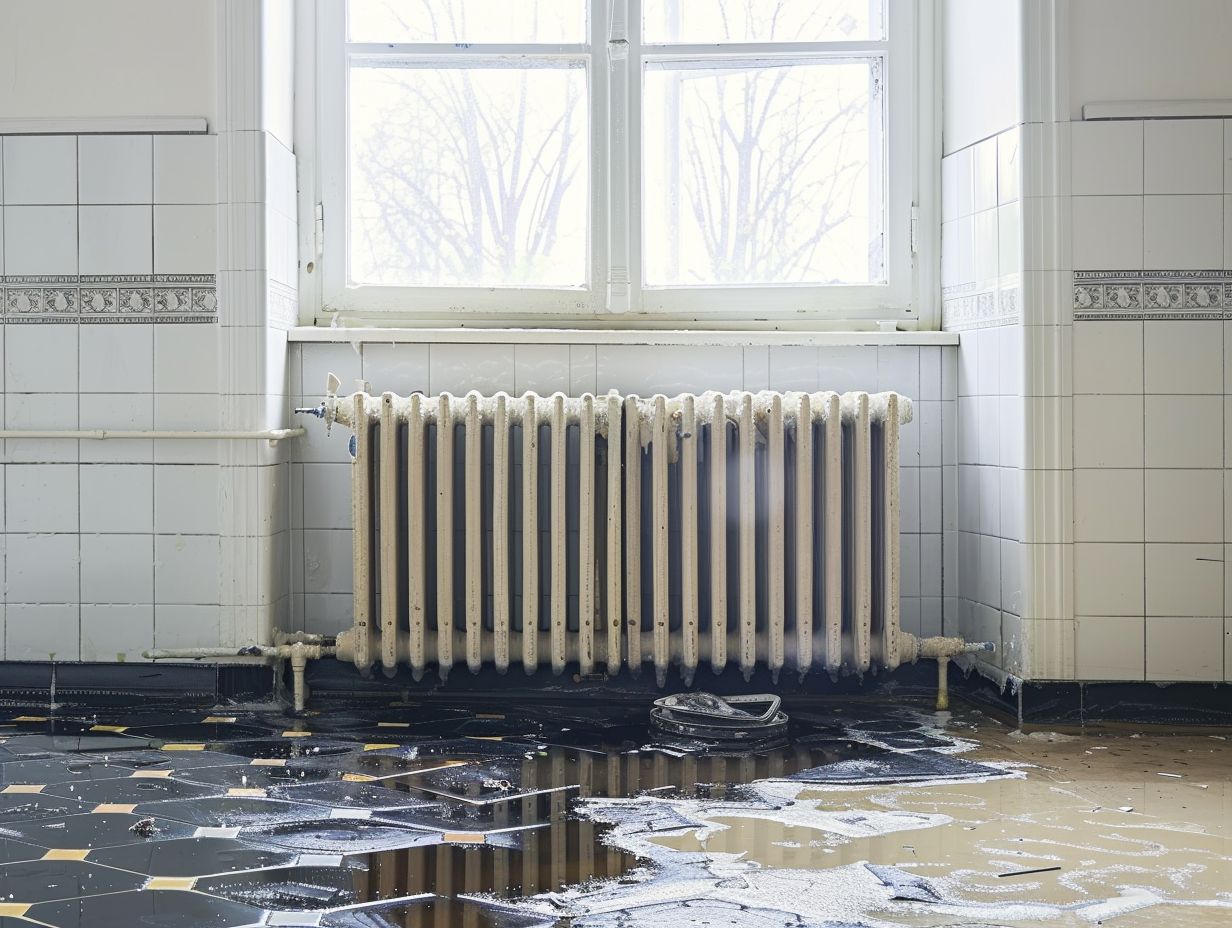
There are several possible reasons for a leaking kitchen radiator, including corrosion, a damaged valve, or high water pressure.
How can I tell if my kitchen radiator is leaking?
One of the most obvious signs of a leaking radiator is the presence of water or water stains around the base of the radiator. You may also notice a decrease in heating efficiency or a musty smell in the kitchen.
Can I fix a leaking kitchen radiator on my own?
It depends on the cause of the leak. In some cases, such as a loose valve, you may be able to tighten or replace it yourself. However, if the leak is due to corrosion or damage to the radiator, it’s best to call a professional plumber.
What should I do if my kitchen radiator is leaking?
If you notice a leak, it’s important to turn off the water supply to the radiator and contact a plumber immediately. Ignoring a leak can lead to further damage and potentially costly repairs.
Will my homeowner’s insurance cover a leaking kitchen radiator?
It depends on your specific insurance policy. Some policies may cover the cost of repairs or replacements for a leaking kitchen radiator, while others may not. It’s best to check with your insurance provider to determine your coverage.
How can I prevent my kitchen radiator from leaking in the future?
Regular maintenance and inspections can help prevent leaks in your kitchen radiator. It’s also important to monitor the water pressure and temperature in your home to ensure they are not too high, which can put added strain on your radiator.

